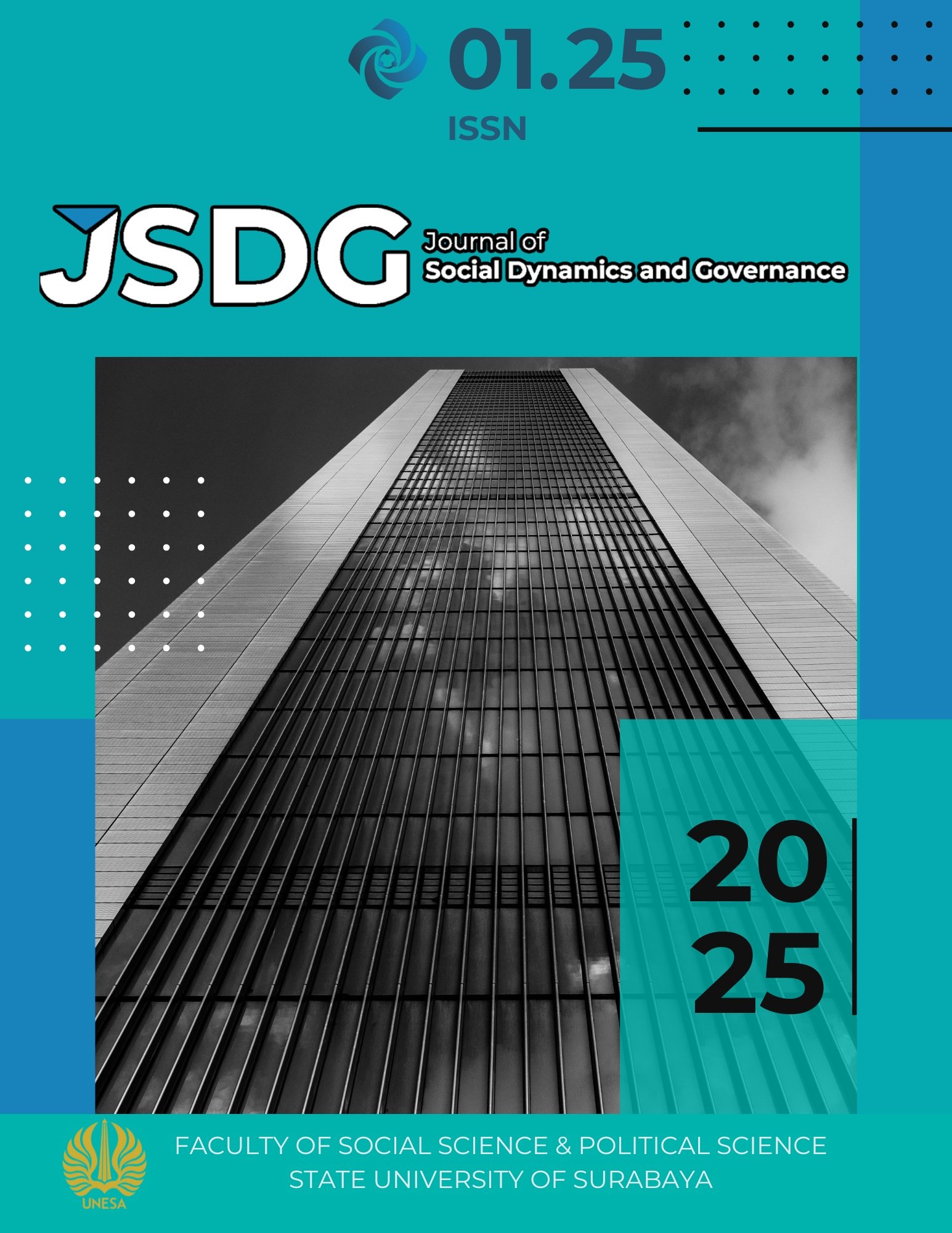Social Construction of Traditional MSME Actors Towards QRIS Digital Payment Adoption in Surabaya
DOI:
https://doi.org/10.26740/jsdg.v2i1.43196Keywords:
Digital Payment, Digitalization of the Economy, MSMEs, QRIS, Social ConstructionAbstract
Technological developments encourage the adoption of digital payment systems in various sectors, including Micro, Small, and Medium Enterprises (MSMEs). However, traditional MSME actors in Surabaya City show diverse responses to this change. This study aims to understand how the social construction of traditional MSME actors towards digital payments is formed. Using a qualitative approach and the social construction theory of Peter L. Berger and Thomas Luckmann, this study explores the processes of internalization, objectivation, and externalization in forming the meaning of the digital payment system. Data were obtained through in-depth interviews with five traditional MSME actors conducted between April and May 2025. Findings indicate that cash payments remain the dominant method, as they are considered easier, safer, and more in line with old habits. Low levels of digital literacy and concerns about the security and complexity of technology are the main obstacles to the adoption of digital payments. However, trust in the digital system has begun to grow gradually, mainly influenced by positive experiences and support from the community, family, and customers. The social construction of MSME actors towards digital payments is formed through ongoing social interactions, so that the adoption of this technology cannot be separated from the social and cultural contexts that surround it.
References
Agustina, D., Yusnita, M & Fitari, T. (2023). Digital Transformation: Optimizing the Use of e-payment for MSME Performance. E3S Web of Conferences, 440, 07005. https://doi.org/10.1051/e3sconf/202344007005
Al-Qudah, A. A., Al-Okaily, M., Alqudah, G,. & Ghazlat, A. (2024). Mobile Payment Adoption in the Time of the COVID-19 Pandemic. Electronic Commerce Research, 24, 427-451. https://doi.org/10.1007/s10660-022-09577-1
Bank Indonesia. (2021). Laporan Perekonomian Indonesia 2021. Jakarta: Bank Indonesia.
Berger, P. L., & Luckmann, T. (1966). The Social Construction of Reality: A Treatise in the Sociology of Knowledge. New York: Anchor Books.
Bourdieu, P. (1984). Distinction: A Social Critique of the Judgement of Taste. Harvard University Press.
Bourdieu, P. (1986). The forms of Capital. In J. Richardson (Ed.), Handbook of Theory and Research for the Sociology of Education (pp. 241-258). Greenwood.
Cahyani, I.G. (2024). Strategi Digitalisasi of Payment melalui QRIS terhadap Peningkatan Pendapatan Usaha pada UMKM mitra QRIS di Kabupaten Banjarnegara. Skripsi, Universitas Islam Negeri Prof. K.H. Saifuddin Zuhri, Purwokerto.
Giddens, A. (1990). The Consequences of Modernity. Stanford University Press.
Granovetter, M. (1985). Economic Action and Social Structure: The Problem of Embeddedness. American Journal of Sociology, 91(3), 481–510.
Kementerian Koperasi dan UKM Republik Indonesia. (2022). Percepatan Transformasi Digital UMKM.
Kudu, Y. U., Pakereng, Y. M., & Kelen, L. H. S. (2023). Efektivitas Penggunaan Payment QRIS pada Transaksi Penjualan Usaha Mikro, Kecil, dan Menengah. Juremi: Jurnal Riset Ekonomi, 3(2), 195-204.
Littlejohn, S. W., & Foss, K. A. (2011). Theories of Human Communication (10th ed.). Waveland Press.
Maskala, K., & Evanthi, A. (2024). Implementasi Sistem Pembayaran Digital bagi UMKM pada Bazar Ragam Rasa di Kota Lama Surabaya. Community Development Journal, 5(6), 12672–12676.
Nurqamarani, A. S., Fadilla, S.,& Juliana, A. (2024). Revolutionizing Payment System: The Integration of TRAM and trust in QRIS adoption for micro, small, and medium enterprises in Indonesia. Journal of Information Systems Engineering and Business in Indonesia, 10(3), 314–327. https://doi.org/10.20473/jisebi.10.3.314-327
Polanyi, K. (1957). The Great Transformation. Beacon Press.
Rachmawati, I., & Susanti, E. (2020). Persepsi Pelaku UMKM Terhadap Penggunaan Fintech dalam Transaksi Keuangan. Jurnal Ilmu Sosial dan Humaniora, 9(3), 155–166.
Rogers, E. M. (2003). Diffusion of Innovations (5th ed.). Free Press.
Rahman, A. (2022). Persepsi Pelaku UMKM terhadap Digitalisasi: Studi Kasus di Pasar Tradisional. Jurnal Sosial Humaniora, 14(2), 115–127.
Preasetia, P. B. W., & Lestari, N. P. N. E. (2023). Cashless Society: Tantangan dan Kesiapan Pedagang Pasar Tradisional di Kota Denpasar. Buletin Studi Ekonomi, 28(1), 83-94.
Tambunan, T. (2020). Transformasi Digital UMKM di Indonesia: Tantangan dan Peluang. Jurnal Ekonomi dan Kebijakan Publik, 11(1), 45–55.
Wahyuni, D., & Prasetyo, A. (2021). Digitalisasi UMKM di Era Pandemi: Peluang dan Tantangan. Jurnal Ekonomi dan Bisnis, 14(2), 87–96.
Yuliani, L., & Ramadhan, M. (2021). Peran Komunitas dalam Mendorong Adopsi Teknologi UMKM di Perkotaan. Jurnal Komunikasi dan Teknologi, 9(1), 21–30.
Downloads
Published
How to Cite
Issue
Section
 Abstract views: 198
,
Abstract views: 198
, PDF Downloads: 182
PDF Downloads: 182



